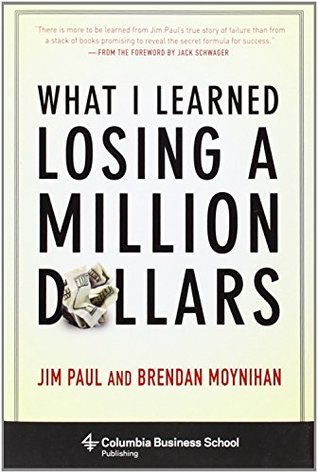More on this book
Community
Kindle Notes & Highlights
Are you being motivated by the prophet motive or the profit motive? In the markets and in business don’t concern yourself with being right. Instead, follow your plan and watch the money. Preoccupation with being right means you’re betting, which personalizes the market and is the root of losses due to psychological factors.
the Five Stages of Internal Loss. Have you ever said to yourself, “No way! Is the market really down that far?” That’s denial. Have you ever gotten mad at the market? Called it a name? Gotten angry at friends or family because of a position? That’s anger. Ever begged the market or God to get you back to breakeven so you could get out? That’s bargaining. Has a market loss ever changed your sleep or diet patterns? That’s depression. Ever have a firm liquidate one of your positions? That’s acceptance.
However, from my trading and gambling experiences I have learned that the more the markets are treated as a game, the less likely you are to have losses due to psychological factors. Why? Games have rules and defined ending points. Their participants have a game plan.
A PBS program on human organ transplantation reported, “The reasons people say no to organ donation vary—few people have actually thought about their deaths and don’t plan for it. Family members often haven’t discussed their wishes about organ donation ahead of time. At a time of crisis the decision can be too traumatic.”16
Philosopher-novelist Ayn Rand was asked one time in a radio interview whether she thought gun-control laws violated the Second Amendment right to bear arms. “I don’t know,” she responded, “I haven’t thought about it.” And she said it in a manner as though it was the most natural thing in the world not to have an answer or opinion.
Therefore, your self-image should not be a function of what you have accomplished but how you have gone about doing it. Think of it this way: if you have a million dollars in the bank but you stole it, your self-esteem can’t be very high. If you earned it, your self-esteem is quite high. Therefore, judge yourself by the degree to which you objectively defined the parameters/conditions that would constitute an opportunity and how well you adhered to them. In other words, pat yourself on the back or kick yourself in the backside depending on whether you develop a plan from a method of analysis,
...more
Lyndon Johnson and the Vietnam War. LBJ did essentially the same thing I did, starting with his belief in past successes. When LBJ considered committing ground forces to Vietnam, he “did so with blind faith
buttressed by remembered victories: The United States always won.”
He would rise at two a.m. (to adjust for the time change) and go to the war room in the basement of the White House so he could monitor developments in Vietnam. Johnson began to identify his personal worth with success in Vietnam. As evidence, consider “LBJ’s impression that he couldn’t lose Vietnam and keep allies or win elections.”22 Johnson had personalized and internalized Vietnam because, for him, it meant his reputation.
“By the end of 1983, Goizueta felt vindicated in the eyes of the world. Columbia, a money machine, earned $91 million in its first full year as a Coca-Cola subsidiary.
As An Wang, founder of Wang Laboratories, said, “It is my belief that there are no ‘secrets’ to success.”19 The formula for failure is not lack of knowledge, brains, skill, or hard work, and it’s not lack of luck; it’s personalizing losses, especially if preceded by a string of wins or profits. It’s refusing to acknowledge and accept the reality of a loss when it starts to occur because to do so would reflect negatively on you.


